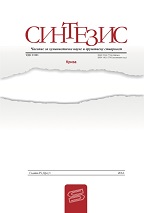Ontological Security of International Organizations: NATO’s Post-Cold War Identity Crisis and "Out-of-Area" Interventions
Ontological Security of International Organizations: NATO’s Post-Cold War Identity Crisis and "Out-of-Area" Interventions
Author(s): Jelena CupaćSubject(s): Politics / Political Sciences
Published by: Центар за хуманистичке науке »Синтезис«
Keywords: NATO; ontological security; international organizations; identity
Summary/Abstract: This article tackles the issue of the NATO’s post- Cold War identity crisis. More precisely, with the employment of the ontological security concept, it seeks to account for NATO’s struggles to position itself in the new security environment that seems to be constantly changing. The overall argument is developed in three stages. First, I have conceived of international organization’s identity through the purpose it fulfills. Second, this entailed the conclusion that a stable purpose renders international organization ontologically secure and, vice versa, absent or unstable purpose renders it ontologically insecure or in other words “anxious”. In the third stage, I have made an inquiry into the nature of the behavior of the ontologically insecure organization through the combination of Jenifer Mitzen’s exogenous (“role identity”) and Brent J. Steele’s endogenous (“intrinsic identity”) accounts about identity formation. Accordingly, I have argued that the behavior of an ontologically insecure international organization is, first and foremost, identity not interest driven behavior. These propositions were then put against the case of the post-Cold War NATO.
Journal: Синтезис - часопис за хуманистичке науке и друштвену стварност
- Issue Year: IV/2012
- Issue No: 1
- Page Range: 19-43
- Page Count: 25
- Language: English

